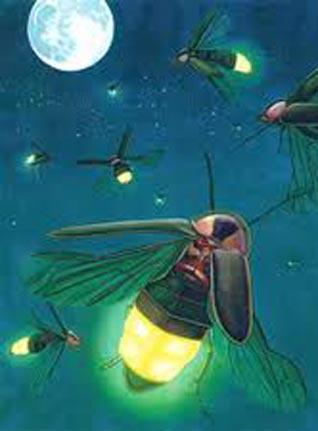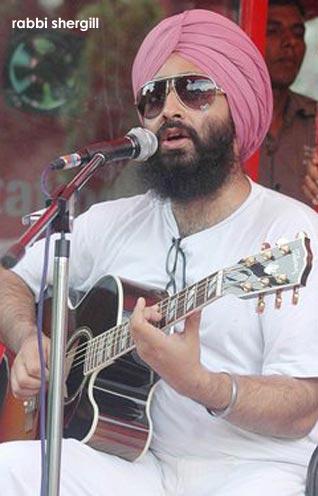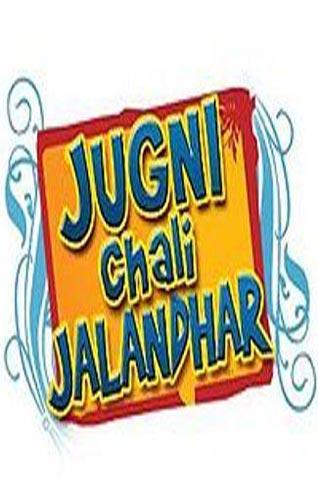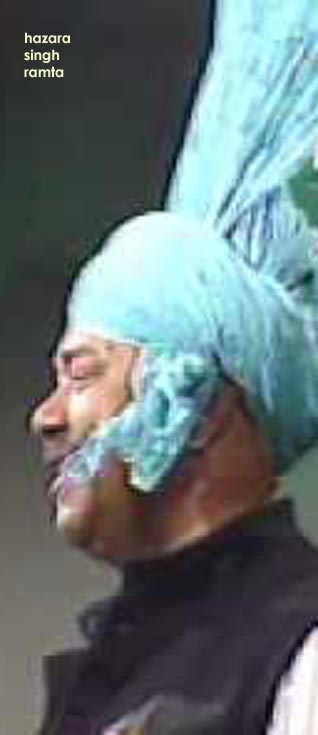Columnists
Eternal Jugni
by KHUSHWANT SINGH [Chandigarh]
Jugni: An ornament or jewel worn by women around the neck. A song about "Jugni".
Jugnu: A firefly
[The Punjabi Dictionary]
Today, Jugni is still as popular in Punjab as ever - she still comes up in modern renditions of old folk songs and in pop music.
This mystery woman has been a part of Punjabi folklore for as long as people can remember.
But who is Jugni?
"Somewhere in
the heartland of Punjab resides a pretty woman whose eternal name is
Jugni."
This was the first line of a book that I had started writing a few years ago.
I don't know why I wrote this line since I did not even have the faintest idea what Jugni essentially stood for.
But having said this, there is no denying the fact there was this mystery surrounding this name ever since my childhood. Perhaps it was folk singer Hazara Singh Ramta who was responsible for creating this image. His Jugni, "Fashion di matwali", whereby he takes Jugni to Karnal where she is seen driving a Fiat car and playing tennis with two plaits, perhaps sowed the first seeds of this fantasy about Jugni being a girl.
The Late Alam Lohar, who is attributed with popularising Jugni, gave it the
charisma.
The quest to find more about this mystery woman
and move forward with my half completed manuscript was re-ignited last
fortnight when I heard Alam Lohar's son, Arif Lohar, sing live. He was
performing in Chandigarh at former bureaucrat Gurnihal Singh Pirzada's
daughter's wedding sangeet.
A great performer, Arif - who has
gained new confidence after the success of the musical programme Coke
Studio - left the audience mesmerised with his modern hip-hop Jugni,
singing it at least six times.
Unable to resist my quest to know
more about Jugni, I marched up to him to ask about the origins of Jugni. "Eh
spiritual heh," he replied in chaste Lahori Punjabi. "My father used to
say it is neither male nor female. It belongs to Allah Tallah which is
aptly reflected in the lyrics of the song," he said.
He sings:
Ae way Allah waliyan di Jugni ji (She's the spirit of all the messengers who brought His message to this earth)
Ae way nabbi pak di Jugni ji (She's the spirit of Holy Prophet)
Ae way Maula Ali wali Jugni ji (She's the spirit of Ali and his followers)
Ae way meray pir di Jugni ji (She's the spirit of my saint)
Ae way saaray sabaz di Jugni ji (She's the spirit of all his words)
But where was the woman?
Jugni for me had always remained a prototype of a Punjabi girl trying to break free.
Suggesting
it as a spirit came across merely as an eye wash for a woman of substance
who was trying to find her way through the maze of male dominance.
Singer
Rabbi Shergill - who has given revolutionary symbolism to his version of
the Jugni - once mentioned during an interaction that Jugni meant an
ornament. According to him, it was a piece of jewel worn around the neck
by women in rural Punjab.
However, the real meaning perhaps lies
in the following description, glimpses of which can be heard in all the
Jugnis being sung - be it Lohar's, Ramta's, Shergill's or Jazzy B's.
Jugni
music, they say, took birth in 1907. It was in all probability created
accidentally by two folk singers Bishna (Sikh) and Manda (Muslim). Both
of them hailed from Majha and sang Mirza and tappey, dhadi style.
In
1907, the British, to commemorate 50 years or the Jubilee year of
complete rule over India (post 1857 mutiny), took a "Jubilee Torch" to
every Indian city. The torch was placed in a gold receptacle and taken through every district headquarters.
Bishan
and Manda, who were of a revolutionary mindset, sang against British
oppression when the Jubilee torch passed through various Majha towns.
They reportedly put their stages close by from where the Jubilee torch
passed and sang their own version about the Jubilee. However, what they
did was, they kept mispronouncing the word Jubilee as Jugni.
Jugni
jaa varhi Majithe, Koi rann na chakki peethe, Putt gabhru mulak vich
mare, Rovan akhiyan par bulh si seete, Pir mereya oye Jugni ayi aa,
Ehnan kehrhi jot jagaee aa ...
It is because of Bishan and Manda that whenever we hear a Jugni verse, it is always linked with some city or village.
My Jugni is however still elusive, and my manuscript incomplete.
[Courtesy: Punjabi By Nature]
February 27, 2011
Conversation about this article
1: Khushwant Singh (Chandigarh, Punjab), February 28, 2011, 7:59 AM.
Irfan Aslam from across the border shares this - 'I have origin of Jugni referring to Jubilee light somewhere else as well. Perhaps at the website of APNA. The second reference to the origin, i.e., an ornament worn by women, is also valid, because, there are other ornaments like Dhola, Kamli, which are now also genres for folk singing. The story of Rawal-Jugni is also popular in the Potohar tradition of Punjab, around the Rawalpindi area. According to this tradition, Jugni was the girl who was in love with Rawal who was killed for his love for her. Jugni did not know about his killing and she became a faqir, wandering in search her Rawal. Hence, the name "RawalPindi"!'
2: Harminder Singh (California, U.S.A.), February 28, 2011, 3:40 PM.
Fascinating! I have often wondered about this. Great article exploring the depths of Punjabi culture and folklore.
3: Dr. Tarlok Singh Sahota (Thunder Bay, Ontario, Canada), February 28, 2011, 4:15 PM.
A friend, the late Dr. Amarjit Singh Sohi (native of Bhanbhaura, Punjab), Professor of Supports Psychology, University of Ibadan, Nigeria, had told me that 'Jugni' stood for 'lehar', a new movement at the socio-cultural level. Periodically, there have been such events in Punjab and of course elsewhere, though I believe Jugni is sung only by Punjabis in Punjabi!
4: Inderjit Singh (Mumbai, India), March 15, 2011, 4:07 AM.
Informative and fascinating. Arif Lohar and Rabbi have given it new life. Thank you.
5: Shama T. Bukhari (Pakistan ), March 16, 2014, 2:56 AM.
Jugni to me sounds like a name of a small musical instrument of Potohar culture ... We Asians are never clear on solid answers. Where does the authenticity lie? What narration can we put together for our young generation?






